Debra Paget recalling her first meeting with Elvis on The Milton Berle Show on June 5, 1956.
"Although I usually don't form an opinion of a person until I have met him," she explained, "frankly
I looked forward to my first meeting with Elvis Presley with mixed emotions. I'd heard and read a lot
about this new young singing sensation from Tennessee—and most of it was not complimentary." According to Paget, though, Elvis impressed her from the very beginning. "The first thing I recall was
the way he greeted us. When Mr. Berle introduced us, Elvis grabbed my hand firmly and said, 'I'm glad to meet you
, Miss Paget.' Then he shook my mother's hand with equal vigor, excused himself, and a couple of minutes later
came back with a chair for her. We were together for only a couple of hours but sometimes you can learn more
about a person in a short span of time than in weeks of seeing one another constantly. I felt I did. From the very
beginning, Elvis impressed me as a pleasant, sincere, obliging young man."
A few months later, Paget learned that Elvis had been given a staring role in a film for which she and Richard Eagan
had already been cast. At first she sensed a great deal of apprehension on the set, but soon, she said, Elvis won over
the cast and crew as he had her a few months earlier.
From then on my family and I saw a lot of Elvis," Paget explained, "—at the studio, on location, when he came over
to our house for a swim on Sundays. I grew to understand him better. I also found out some things which really surprised me."

One of the things that surprised her was Elvis's sensitivity. "At first I'd been under the impression that he was quite indifferent to the attacks made on him for the way he sings, dresses, wears his sideburns, and all the other comments. But he isn't. Not that he'd admit the fact easily to a stranger … I could tell he was deeply hurt when his performances were criticized, or when he was threatened with being banned from certain cities."
Another thing that amazed Paget was how easily Elvis adapted to acting. "Had anyone told me that he'd never had a dramatic lesson, never stood in front of a movie camera, I wouldn't have believed it. His acting was convincing, he always knew his lines, he picked up like a trouper the purely technical aspects, like moving in and out of camera range, and the many other tricks of the trade that usually take months and years of experience to learn. However, he was so modest about his ability to catch on quickly, he was just about the only person who didn't think he was doing well."
Paget mentioned that some of her friends had asked her if Elvis had "romantic appeal." She addressed the question in a matter-of-fact manner. "I'm convinced he has, and that it will come across on the screen. It is certainly felt by those who meet him, although I don't think Elvis himself is conscious of it. He certainly never talks about his 'conquests.'"
The actress portrayed her own relationship with Elvis as being more family-oriented than romantic. "From the time he first came to the house," she recalled, "my folks have considered Elvis a member of the Paget clan—a feeling which, I believe, he reciprocated. I had the feeling that our closely-knit family life must resemble his own to quite an extent. And I could tell how much he missed his parents."
Elvis told Debra that one night in Hollywood he felt so lonesome that he called his parents in Memphis. The phone rang several times before his mother answered. Elvis said, "Hi, mom. What're ya doin'?" She responded, "What do you think I'm doing—I'm sleeping!" Elvis hadn't stopped to realize that, while it might be 11 p.m. in Los Angeles, it was 1 a.m. in Memphis.
Although Elvis was obviously a unique young man, Debra Paget concluded that in many ways he was a "normal, healthy twenty-one year old." For one thing, he had a large amount of energy to burn. She learned that one morning when she walked onto the set. "Someone shouted 'DUCK!'—a split second before a football shot past my head," she remembered. "A moment later Elvis was by my side, breathless and apologetic. 'Ah'm so sorry, Debra. (I finally talked him into calling me by my first name.) Ah didn't mean to scare you." She explained that Elvis and his cousin Gene were always active when they had some free time on the set. "When they don't play football they throw a baseball, have mock fights with knives or hatchets, or find some other way to entertain themselves."
The magazine article concluded with Debra Paget assessing Elvis's future chances for success in the entertainment business. "I will gladly take a chance on predicting that Elvis Presley will continue to retain his popularity, regardless of rock 'n' roll: and I mean popularity not only with the fans who see him in the movies, or TV, or his personal appearances, but even more so with people who are fortunate enough to meet him in person. Elvis Presley is here to stay."
While Love Me Tender marked the beginning of Elvis Presley's Hollywood career, it came at the same time that Debra Paget's career began to decline. In 1955 20th Century Fox had cancelled her exclusive contract after she appeared in a non-Fox film. After Love Me Tender she had roles in 12 more films before retiring from Hollywood at the age of 29 in 1962. She married three times and had one son.

 Let's start with some basics. Officially titled Singer Presents Elvis, after it's sponsor, the Singer Sewing Machine Company, Elvis's special first aired on the NBC-TV network at 9 p.m. on Tuesday, December 3, 1968. The program had been heavily promoted with
Let's start with some basics. Officially titled Singer Presents Elvis, after it's sponsor, the Singer Sewing Machine Company, Elvis's special first aired on the NBC-TV network at 9 p.m. on Tuesday, December 3, 1968. The program had been heavily promoted with Years later the generally accepted consensus concerning Elvis's '68 TV special is summed up by Ernst Jorgensen in his book Elvis: A Life In Music. He wrote that the special, "only gave Elvis' record sales a modest boost at first, but its real effect
Years later the generally accepted consensus concerning Elvis's '68 TV special is summed up by Ernst Jorgensen in his book Elvis: A Life In Music. He wrote that the special, "only gave Elvis' record sales a modest boost at first, but its real effect
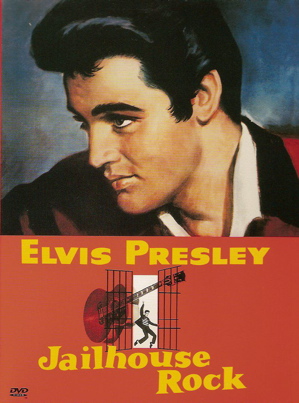 The following three anecdotes appeared in the press within a week following the release of
The following three anecdotes appeared in the press within a week following the release of 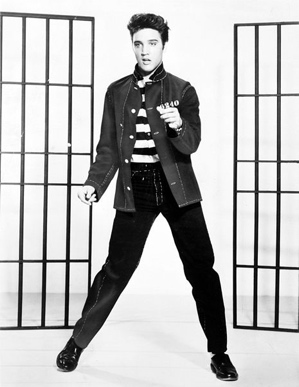 "We sure don't allow lashings here," Bailey told reporters.
"We sure don't allow lashings here," Bailey told reporters.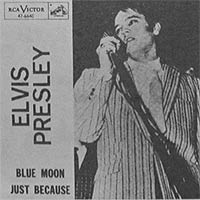 "On August 19 they spent hours doing take after take of 'Blue Moon,' in an
"On August 19 they spent hours doing take after take of 'Blue Moon,' in an 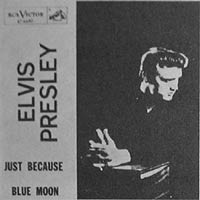 It soon became apparent that of the seven singles, Blue Moon/Just Because was selling the best. In its September 22
It soon became apparent that of the seven singles, Blue Moon/Just Because was selling the best. In its September 22









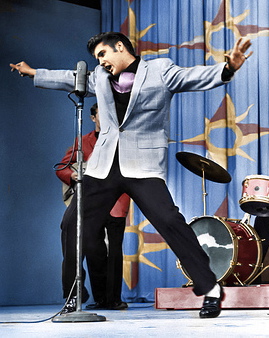 By early June 1956, the nation certainly knew who Elvis Presley was. He already had appeared on national TV seven times,
By early June 1956, the nation certainly knew who Elvis Presley was. He already had appeared on national TV seven times,